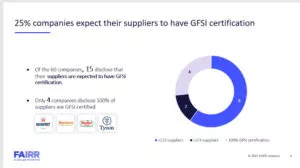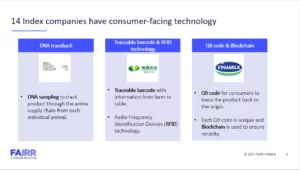GFSI and FAIRR Initiative recently held a webinar to celebrate World Food Safety Day on Safe Food Now for a Healthy Tomorrow. GFSI Senior ManagerAnne Gerardi was joined by Wai-Chan Chan, Managing Director at the The Consumer Goods Forum, Maria Montosa, ESG Analyst at FAIRR Initiative, and Suresh Mistry, Co-Founder and head of ESG for Alquity.
Anne first discussed the importance of meaning behind Safe Food Now for a Healthy Tomorrow. This year focused on the longer benefits of food safety in terms of social, environmental, economic, and health benefits. This makes a discussion with the finance and ESG community essential because they have invested into these long-term benefits.
When asked by Anne about why this discussion is critical for the CGF agenda, Wai-Chan begins by saying that in addition to ESG investors, there are now many investors who also look at ESG aspects of companies as one of their components. So, there are now two types of investors looking at the ESG. From an investor perspective, the two are already linked together.
Wai-Chan then gave further insight into what the CGF is doing through the Coalitions that help achieve tasks.These include Food Safety, Product Data, Collaboration for Healthier Lives, Forest Positive, Sustainable Supply Chain, Plastic Waste, Food Waste, and Forced Labour. What is unique about the CGF is that it has combined the manufacturers with retailers using CEOs to drive the action. He then mentions the Food Systems Summit, which also plays a unique role in that food safety is going to be a massively important component.
Anne then asked Maria: what is the FAIRR Initiative and the role she plays. Maria, ESG Analyst, explained that FAIRR Initiative focuses on raising awareness of the environmental, social, and governance risks and opportunities brought by intensive livestock production. The Coller FAIRR Protein Producer Index is an ESG benchmark assessment of the 60 largest listed animal protein companies across 10 risk and opportunity factors that we have identified as the most material to this sector, among which Food Safety is included. They then provide investors with detailed information about these companies, which they can then use to make decisions across their selection processes, such as portfolio construction, due diligence, corporate engagement and stewardship. FAIRR Initiative also engages with Index
companies, which use their methodology and recommendations to improve their sustainability performance.
Suresh introduced himself next as the Co-Founder at Alquity, an emerging market equities investment house that focuses on using ESG in their investment process. He first explains the business model. One important aspect is attractive returns. Alquity has been talking about ESG since being founded in 2010, and they therefore have responsible investments, and a portfolio of companies that investors are proud to work with. Alquity considers both their investors capital, as well as their own personal capital, so they take 10 percent of the company revenue to donate to the Alquity Transforming Lives Foundation, which develops projects in the countries where they invest, to help some of the poorest people on the planet join the economic ladder. This helps build a sustainable economy, and will also help their investments in the long-term. This work can also help with insights into potential new companies. Suresh shares that Alquity has already donated around 2.5 million dollars.
Anne then asked Maria about when and why FAIRR Initiative started to engage on food safety. Maria answered that statistics show that food contamination and food recalls are frequent in the meat industry. It is estimated that a product recall can cost a company $10 million. This is normally due to costs from setting-up logistics to recall products, transportation, increased labour, and all the indirect costs associated with the company’s damaged reputation and lawsuits. She explained that the meat industry is also vulnerable to other emerging issues, such as antibiotic resistance bacteria, which are particularly dangerous because they cannot be easily treated with existing antibiotics. For example, in 2018, JBS had to recall 12 million pounds of raw beef due to risks of antibiotic-resistant salmonella contamination, which made the company’s share price fall as much as 5%.Maria explained that food safety is a particularly important risk factor because there is a materiality linked to food safety. Companies that have poor food safety management risk their licence to operate.
Suresh then answered a question from Anne about why food safety is critical in regards to financial performance. He began by reiterating that they are not food safety experts, and as ESG investors, product integrity is critical, which makes food safety critical in the food and beverage industry. As investors, food safety is the impact on returns, therefore food safety scandals want to be avoided. He believes the need for hygiene standards becomes even more critical in an urbanised area, where there is more distance between the farm and the fork. He then mentioned how food safety tends to be a bigger issue in poorer parts of the economy, and these places are also most at risk for miscommunication on food safety. He mentioned that as activists investors they don’t look only at food safety but how companies are innovating and anticipating their future role in their food ecosystem and their future positive and negative impacts on the planet and society as food business operators.
Anne then mentioned the Food Systems Summit. She asked Wai-Chan about his thoughts as well as how the CGF is working on that. Wai-Chan believes that the UN is trying to promote the idea that we need to transform our food systems for the world to be a sustainable place. He says that the goal is to get all different types of actors together to identify ways of transforming the food systems to make them more sustainable. He then says that two of the five action tracks overlap with what the CGF does. Those include: access to safe food, and sustainable consumption patterns. The three ideas that the CGF would like screened into the UN Food Systems Summit are food safety ideas, food waste, and collaboration for healthier lives. The challenge is getting people to sign up so that these ideas can be discussed and eventually turned into coalitions.
Next, Anne asked Suresh what he is looking for in regards toin regard to food safety as an investor. Suresh said it’s a combination of things that investors look for. Some of these aspects include food traceability, use of antibiotics, the policies that these companies implement to support suppliers, a health and safety policy, corporate governance and the possibility of having a whistleblowing mechanism and regulatory standards that they achieve. He also addressed the large reputational risk as well as the risk of loss of market access and licence to operate and the support and alignment from the top management on food safety. Based on Suresh’s answer, Anne said it coincides fully with GFSI’s vision and she announced that GFSI is finalising its strategic review of its capacity building programme to revolutionise it and think about capacity building and food safety as whole in the food systems and how the future programme can help attaint the SDGs.
When asked why she is integrating GFSI in the food safety risk factor, Maria said they recognise GFSI as one of the most important certifications to be aligned with in our Food Safety Risk Factor. Having GFSI certification means that the animal protein producer company operates with a structured, comprehensive, and adequate food safety management program.
Maria then explained how the Index methodology was built, and they include GFSI.
In the Index, the Food Safety risk factor comprises 2 KPIs: Food Safety System and Product recalls and market bans. GFSI is integrated in the Food Safety System KPI, where they look at the company’s direct operations and suppliers. For best practice, a company should have 100% of its owned facilities, and suppliers GFSI certified. The company should also disclose the frequency of audits and corrective action rates due to non-conformance. Finally, they also look at food safety innovation.
Anne asked Maria if she would expect or want more information about how many of their facilities are GFSI certified- and how many are 100% certified. Maria says that it would definitely be beneficial to share this information, because this type of transparency is appreciated by stakeholders and investors. Suresh agreed that this is helpful for investors, particularly because they want to understand and engage with the companies they invest in. Anne then took a question from the audience, asking whether recall is a good measure of food safety culture in a company and why was this KPI chosen? Maria answered first saying that companies who publicly disclose food recalls receive higher points on the Protein Producer Index because of the importance of that transparency. This information is important to investors, stakeholders, and the community. Suresh joined the conversation saying that they are active investors, and it would therefore be quite difficult to hide a food safety issue.
The next question was: how do you manage to introduce innovation and traceability technologies in your expertise? Maria said they look at whether companies implement technology that provides traceability all the way to the end customer, such as blockchain technology, that creates visibility and accountability in the supply chain. These technologies make it easier to determine where food contamination may have occurred, and can reduce the likelihood of meat companies committing fraud.
Suresh then answered saying that this goes back to the quality of the organisation. At Alquity, they rate companies in terms of their journey or degree of quality, and innovation is one factor. This enables them to adjust the valuation of the company to reflect what that innovation will bring. He continues saying that traceability can reduce costs or increase potential margins, and innovation can bring new consumers. It’s important for investors to identify the next innovators and the next great opportunity.
Anne concluded the webinar by thanking the guests and the audience, and saying she hopes this inspires everyone to recognise the link between finance and food safety and we break a lot more the silos between food safety and the rest of the business, hoping that this webinar can help us all to collaborate better on food safety as we learned during this webinar than food safety is more than food safety it is about making food systems more resilient, equal to attain the SDGs!.

